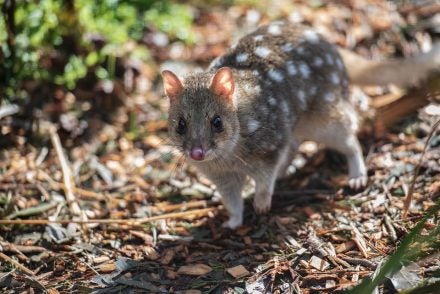You cannot repeal the law of unintended consequences
Published 4:20 pm Friday, September 30, 2022

- Quoll populations have suffered from cane toad infestations. But is gene editing the right answer? (Stock Photo, credit to pen_ash with pixabay.)
|
Getting your Trinity Audio player ready...
|
Have you had that feeling in the pit of your stomach when you’re watching something horrible about to unfold, but can’t stop it? That’s how I feel watching biotech companies embracing genetic modification as the newest way to “solve” environmental problems, be they real or imagined.
I’ve written about Colossal Bioscience’s insane plans to revive and release extinct species like the woolly mammoth and Tasmanian tiger to try and fix everything from climate change to habitat destruction. While I’ve been cautiously optimistic about the Tasmanian tiger proposal, the mammoth project is pure childish fantasy, more likely to cause more harm than good if enacted.
But de-extinction isn’t the only tactic reckless biotech companies, many of which are funded by oligarchs with God complexes, like Bill Gates, aim to employ. As if reintroducing extinct animals wasn’t bad enough, there are also pushes to release genetically modified extant organisms into the environment to fight everything from diseases to other invasive species.
One example is the proposal made by scientist from the University of Melbourne, that aims to genetically modify Australian quolls to be able to process cane toad toxins.
I’ve mentioned cane toads before; the toads, native to South and Central America, were imported to Australia in the 1930s to curb beetles plaguing sugarcane crops. This blew up in the scientists responsible faces, as the toads did little to curb the beetles population, but proceeded to wreak havoc on the rest of the ecosystem. There’s little the toads won’t eat; but on the other hand, their toxic skin means there’s little native to Australia that can eat them. Their natural predators had evolved a natural tolerance to their venom over time; the native species of Australia were woefully underprepared for the Biblical plague of toxic morsels unleashed on them.
One species hurt by this is the northern quoll, a little carnivorous marsupial that resembles a mix of a cat, a rat and a possum. They’ll happily gobble up the toads, unaware they’ve eaten their last meal. Dr. Stephen Frankenberg wants to modify the little critter’s genome so that they can tolerate the toxin, which kills by binding to and disrupting the portion of cells that maintain salt balance. Frankenberg argues that the proposed modification, which would only change two letters of the quoll’s DNA, will modify the affected portion of the cell to resist this.
This is an incredibly delicate situation; the cane toad infestation is a man-made menace. Australian scientists and officials, hot off the heels of wiping out the Tasmanian tiger just a few years prior, stupidly blundered their way into an even bigger ecological disaster of their own making, and something has to be done.
But I’m not sure introducing a new species to fight another is the way to go about it; that’s kind of how the whole crisis started. These modified quoll aren’t a totally alien species, but the nature of this modification on future generations can’t be predicted. Sure, if everything goes to plan, then they’ll put a dent in the toads, and pass their resistance on to future generations. But nature is inherently unpredictable. Who’s to say the modified genes won’t naturally mutate further in future generations, to the marsupial’s detriment?
Nothing definitive has been done with this, it’s currently just proposals and lab experiments right now.
It’s the mosquito experiments that are currently going on now concern me even more.
I’d be lying if I said I didn’t hate mosquitoes, everyone hates them. However, there’s currently an experiment in the Florida Keys by the Bill Gates-funded biotech company Oxitec that has the potential to radically change things.
Oxitec, based in the UK, began the experiment in April of last year, releasing millions of genetically modified mosquitos over several months in the Keys. The male mosquitos carry a gene that kills female offspring before they reach sexual maturity, which would obviously have a drastic impact on the population. This has been touted as the next step in curbing diseases like malaria and dengue fever that mosquitos transmit.
However, such a gene sounds incredibly dangerous to be playing around with. While reports say the gene only persisted in the wild for a few months before disappearing, and carriers remained within a few hundred meters of the release site, this really means nothing. The fact the mosquitos are on an island chain like the Keys probably has something to do with why carriers never got too far. Should this be tried on the mainland, as they are apparently wanting to do in California, and this gene spreads, this could potentially spell an ecological disaster.
Would I miss mosquitos if they died out tomorrow? Nope. But no domino falls in a vacuum. Mosquitos are a part of the food chain, with many species depending on them for food; I shouldn’t have to explain why devastating them would be bad for everything.
The most concerning part of these experiments isn’t just the arrogance; we have computers, CRISPR gene editing and mRNA technology and suddenly we feel like we’re immune from making the same mistakes as our forefathers. The most concerning part is that these scientists are playing fast and loose with things that cannot be measured, nor undone.
Biochemist Erwin Chargaff once said, “You can stop splitting the atom; you can stop visiting the moon; you can stop using aerosols; you may even decide not to kill entire populations by the use of a few bombs. But you cannot recall a new form of life.”





